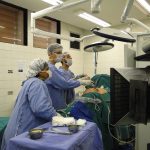
A new artificial intelligence (AI) company wants to cut years off drug development by letting AI run laboratory experiments.
Lila Sciences launched this month with $200 million in seed funding to build what it calls “scientific superintelligence.”
The Cambridge, Massachusetts company combines AI with robotic labs to automate the scientific process from start to finish. In early tests, Lila created hundreds of new antibodies and discovered materials for green hydrogen production in just months instead of years.
“Our hypothesis is that by scaling experimentation, we can unlock emergent abilities and enable discoveries that remain hidden at smaller scales,” said Geoffrey von Maltzahn, Lila’s CEO and a partner at Flagship Pioneering, the company that created Lila in 2023.
Drug development is extremely slow and expensive. According to Nature Medicine, creating a successful drug takes 12 to 15 years and costs about $2.6 billion. More than 90 percent of drugs that enter human testing fail.
Lila’s approach could change this by letting scientists test many more ideas much faster. The company uses AI to analyze scientific data, design experiments, and then run them in automated labs with robots handling the physical work.
The company emphasized that they don’t aim to replace human researchers, but rather to supplement them. “We’re not imagining a world in which humans aren’t part of the scientific process,” said Molly Gibson, Lila’s president of future science. She believes faster early research will help later stages work better too, possibly increasing success rates in clinical trials.
The company has attracted prominent scientific talent, including renowned geneticist George Church as chief scientist. “I think science is a really good topic for AI,” Dr. Church said, noting that scientific results can be clearly measured and tested.
Other companies are also working on AI for drug discovery. Recursion Pharmaceuticals and Isomorphic Labs (a spinoff from Google DeepMind) have similar goals. Google DeepMind CEO Demis Hassabis predicts that the first AI-designed drugs could begin human testing by late 2025.
Andrew Beam, Lila’s chief technology officer, explains that AI models specialized for scientific domains might require “30 times more compute than training the original foundation model.” This represents a massive computational investment that could pay dividends in discovery speed.
Lila won’t develop its own drugs. Instead, it plans to partner with biotech companies to turn its discoveries into real products. The company plans to expand its lab space and open offices in San Francisco and London within two years.
While some scientists remain skeptical about AI’s ability to revolutionize drug discovery, Lila’s approach of combining AI with physical labs addresses a key limitation: moving beyond predictions to actual experimental validation.



















